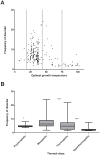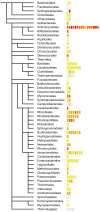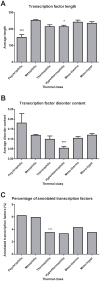Reduction in structural disorder and functional complexity in the thermal adaptation of prokaryotes
- PMID: 20711457
- PMCID: PMC2920320
- DOI: 10.1371/journal.pone.0012069
Reduction in structural disorder and functional complexity in the thermal adaptation of prokaryotes
Abstract
Genomic correlates of evolutionary adaptation to very low or very high optimal growth temperature (OGT) values have been the subject of many studies. Whereas these provided a protein-structural rationale of the activity and stability of globular proteins/enzymes, the point has been neglected that adaptation to extreme temperatures could also have resulted from an increased use of intrinsically disordered proteins (IDPs), which are resistant to these conditions in vitro. Contrary to these expectations, we found a conspicuously low level of structural disorder in bacteria of very high (and very low) OGT values. This paucity of disorder does not reflect phylogenetic relatedness, i.e. it is a result of genuine adaptation to extreme conditions. Because intrinsic disorder correlates with important regulatory functions, we asked how these bacteria could exist without IDPs by studying transcription factors, known to harbor a lot of function-related intrinsic disorder. Hyperthermophiles have much less transcription factors, which have reduced disorder compared to their mesophilic counterparts. On the other hand, we found by systematic categorization of proteins with long disordered regions that there are certain functions, such as translation and ribosome biogenesis that depend on structural disorder even in hyperthermophiles. In all, our observations suggest that adaptation to extreme conditions is achieved by a significant functional simplification, apparent at both the level of the genome and individual genes/proteins.
Conflict of interest statement
Figures




Similar articles
-
Some like it cold: biocatalysis at low temperatures.FEMS Microbiol Rev. 2004 Feb;28(1):25-42. doi: 10.1016/j.femsre.2003.07.003. FEMS Microbiol Rev. 2004. PMID: 14975528 Review.
-
Analysis of tRNA composition and folding in psychrophilic, mesophilic and thermophilic genomes: indications for thermal adaptation.FEMS Microbiol Lett. 2010 Apr;305(2):100-8. doi: 10.1111/j.1574-6968.2010.01922.x. Epub 2010 Feb 5. FEMS Microbiol Lett. 2010. PMID: 20659165
-
Prevalent structural disorder carries signature of prokaryotic adaptation to oxic atmosphere.Gene. 2014 Sep 10;548(1):134-41. doi: 10.1016/j.gene.2014.07.002. Epub 2014 Jul 5. Gene. 2014. PMID: 24999584
-
Adaptation of proteins from hyperthermophiles to high pressure and high temperature.J Mol Microbiol Biotechnol. 1999 Aug;1(1):101-5. J Mol Microbiol Biotechnol. 1999. PMID: 10941791 Review.
-
Proteins from hyperthermophiles: stability and enzymatic catalysis close to the boiling point of water.Adv Biochem Eng Biotechnol. 1998;61:37-85. doi: 10.1007/BFb0102289. Adv Biochem Eng Biotechnol. 1998. PMID: 9670797 Review.
Cited by
-
Intrinsically disordered proteins of viruses: Involvement in the mechanism of cell regulation and pathogenesis.Prog Mol Biol Transl Sci. 2020;174:1-78. doi: 10.1016/bs.pmbts.2020.03.001. Epub 2020 Apr 2. Prog Mol Biol Transl Sci. 2020. PMID: 32828463 Free PMC article. Review.
-
The role of semidisorder in temperature adaptation of bacterial FlgM proteins.Biophys J. 2013 Dec 3;105(11):2598-605. doi: 10.1016/j.bpj.2013.10.026. Biophys J. 2013. PMID: 24314090 Free PMC article.
-
On the Roles of Protein Intrinsic Disorder in the Origin of Life and Evolution.Life (Basel). 2024 Oct 15;14(10):1307. doi: 10.3390/life14101307. Life (Basel). 2024. PMID: 39459607 Free PMC article. Review.
-
Predicting the optimal growth temperatures of prokaryotes using only genome derived features.Bioinformatics. 2019 Sep 15;35(18):3224-3231. doi: 10.1093/bioinformatics/btz059. Bioinformatics. 2019. PMID: 30689741 Free PMC article.
-
Environmental Pressure May Change the Composition Protein Disorder in Prokaryotes.PLoS One. 2015 Aug 7;10(8):e0133990. doi: 10.1371/journal.pone.0133990. eCollection 2015. PLoS One. 2015. PMID: 26252577 Free PMC article.
References
-
- Deming JW. Psychrophiles and polar regions. Curr Opin Microbiol. 2002;5:301–309. - PubMed
-
- Blochl E, Rachel R, Burggraf S, Hafenbradl D, Jannasch HW, et al. Pyrolobus fumarii, gen. and sp. nov., represents a novel group of archaea, extending the upper temperature limit for life to 113 degrees C. Extremophiles. 1997;1:14–21. - PubMed
-
- Puigbo P, Pasamontes A, Garcia-Vallve S. Gaining and losing the thermophilic adaptation in prokaryotes. Trends Genet. 2008;24:10–14. - PubMed
-
- Szilagyi A, Zavodszky P. Structural differences between mesophilic, moderately thermophilic and extremely thermophilic protein subunits: results of a comprehensive survey. Structure. 2000;8:493–504. - PubMed
Publication types
MeSH terms
Substances
LinkOut - more resources
Full Text Sources
Other Literature Sources
Miscellaneous

